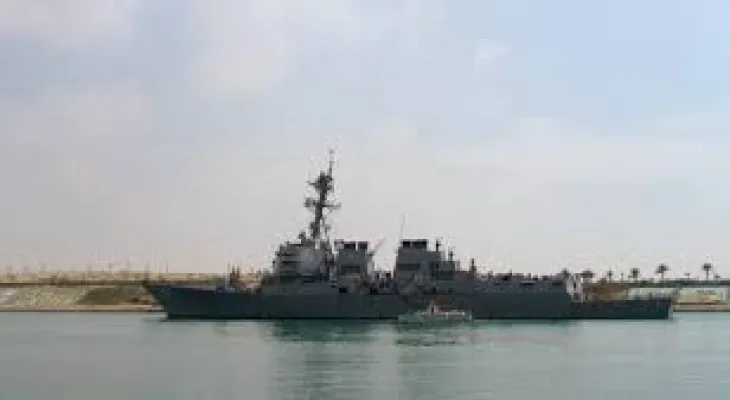Search here
Newspaper
Search here

Arab Canada News
News

Published: January 15, 2024
A missile launched by Yemeni Houthi rebels struck a ship owned by the United States today, Monday, off the coast of Yemen in the Gulf of Aden, less than a day after they fired an anti-ship cruise missile towards a U.S. destroyer in the Red Sea.
The attack on the M/V Gibraltar Eagle, which the Houthis later claimed responsibility for, escalated tensions roiling the Red Sea following U.S.-led strikes on the rebels. The Houthi attacks have disrupted global shipping amid Israel’s war with Hamas in the Gaza Strip, targeting a vital corridor linking energy and goods shipments in Asia and the Middle East to the Suez Canal and then to Europe.
The Houthi military spokesperson, Brigadier General Yahya Saree, said in a recorded television statement that "the Yemeni armed forces consider all American and British ships and warships involved in the aggression on our country as hostile targets.”
Struck "Port Side
The United Kingdom Maritime Trade Operations, which oversees Middle East waters, said Monday’s attack occurred about 177 kilometers southeast of Aden. It added that the ship’s captain reported that "the port side of the ship was hit by a missile from above.”
Private security firms Ambrey and Dryad Global told The Associated Press that the ship was the Gibraltar Eagle, a Marshall Islands-flagged vessel.
The U.S. military’s Central Command later acknowledged the strike and blamed the Houthis for the attack.
Central Command said, "The ship reported no injuries or serious damage and continues its voyage.”
The ship is owned by Eagle Bulk, a Stamford, Connecticut-based company traded on the New York Stock Exchange. In a statement to The Associated Press, the company acknowledged the strike and said it caused "limited damage to the cargo hold but [the ship] is stable and is heading out of the area.”
The company said, "All sailors who were on board the ship are confirmed to be unharmed.” "The ship is carrying a shipment of steel products. Eagle Bulk management is in close contact with all relevant authorities regarding this matter.”
Satellite tracking data analyzed by The Associated Press showed the Eagle Gibraltar was heading to the Suez Canal but quickly turned around at the time of the attack.
Weeks of attacks on shipping
Sunday’s attack on the U.S. warship also marks the first strike the U.S. has acknowledged by the Houthis since the United States and its allies began strikes Friday on the rebels, following weeks of attacks on shipping in the Red Sea.
It was not immediately clear whether the United States would respond to the recent attacks, although President Joe Biden said he "would not hesitate to take further actions to protect our people and the free flow of international trade as necessary.”
U.S. Central Command said in a statement that Houthi fire on Sunday targeted the USS Laboon destroyer operating in the southern Red Sea.
The Houthis did not immediately acknowledge that attack.
The United States said the missile came near Hodeidah, a Red Sea port city long controlled by the Houthis.
Central Command said, "An anti-ship cruise missile was launched from Iran-backed Houthi areas in Yemen toward the USS Laboon.” "No injuries or damage were reported."
Striking Houthi sites
The first day of U.S.-led strikes Friday hit 28 locations and struck more than 60 targets with cruise missiles and bombs launched by fighter jets, warships, and submarines. The United States said the bombed sites included weapons depots, radars, and command centers, including remote mountain areas.
The Houthis have yet to acknowledge the extent of damage from the strikes, which they say killed five of their forces and wounded six others.
U.S. forces followed up with a Saturday raid on a Houthi radar site.
Shipping activity in the Red Sea has slowed due to the attacks. The U.S. Navy warned American-flagged vessels Friday to stay clear of areas around Yemen in the Red Sea and the Gulf of Aden for 72 hours after the initial airstrikes.
The Houthis, for their part, claimed, without evidence, that the United States struck a site near Hodeidah on Sunday at about the same time it launched the cruise missiles. The Americans and the British have not acknowledged carrying out any strike — suggesting the explosion may have been caused by a misfired Houthi missile.
Since November, the rebels have frequently targeted ships in the Red Sea, saying they are retaliating for Israel’s attack in Gaza against Hamas.
But they have often targeted ships with tenuous or no clear links to Israel, putting maritime shipping on a major global trade route at risk.
Comments